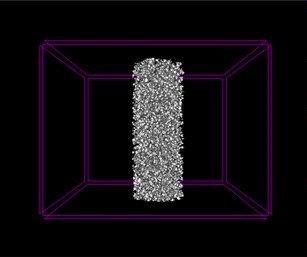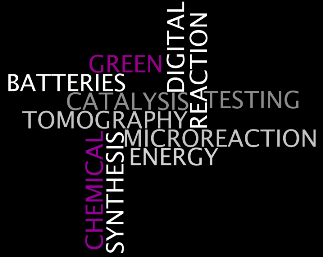Chemical Engineering
 |
 |
Our Laboratories
Laboratory for Energy Intensified Reactor Engineering (Evgeny Rebrov)
Working at the interface between catalytic reactor engineering, applied physics and material nano-engineering, Rebrov’s research group studies hydrodynamics, mass- and heat- transfer in novel chemical reactors with a strong focus on the application of non-conventional energy sources to activate catalysts and to intensify reaction and transport processes. Examples of such non-conventional energy sources are microwave (MW) and radiofrequency (RF) fields. Current research can be grouped under development of composite magnetic materials for microwave and RF heating, study of organic synthesis in flow reactors and study of capillary hydrodynamics of multiphase flows in microreactors.
Laboratory for Energy Materials & Green Chemistry (Shanwen Tao)
Sustainable synthesis and green chemistry: synthesis of chemicals or materials by renewable resources with low carbon emission. Typical methods are electrochemical synthesis and photosynthesis. Battery and fuel cells: metal air batteries, solid state batteries, redox flow batteries, solid oxide fuel cells, molten carbonate fuel cells and proton-exchange membrane fuel cells etc. Gas separation: O2, H2 and CO2 separation. Waste water treatment: using electrochemical methods for waste water treatment.
INCALab: Innovative Catalysis Laboratory (Volkan Degirmenci)
The research group is focused on development of new catalysts and processes for the sustainable production of fuels and chemicals. Our objective is to develop a complete understanding of catalytic reactions at catalytic surfaces through experimental studies. We employ advanced catalyst characterization techniques; in-situ or operando spectroscopy. The molecular-level understanding of catalytic processes guides the development of new catalytic materials and chemical processes. We are particularly interested on utilisation of renewable biomass feedstocks into monomers for bio-plastics and bio-fuels for renewable energy generation.
Laboratory for Heterogeneous Catalysis (Andre C. van Veen)
Centre of activity is heterogeneous catalysis with major expertise in the industrially relevant area to development of process elements for the activation of short chain hydrocarbons. A holistic development approach is followed whenever possible, which joins the elements of (1) analysis of elementary reaction paths, (2) (micro-)kinetic consideration of the catalytic reaction, (3) selection or development of suitable reactor systems and (4) development of superior catalysts. Detailed insight into catalytic reaction steps and related rates allow development towards a global performance optimum hardly reachable by separate tuning of individual aspects.
The laboratory is in the possession of advanced catalysis preparation facilities, automated catalyst testing equipment operating up to 50bars and the Temporal-Analysis-of-Products (TAP) techniques providing unique mechanistic and kinetic insight into catalytic reaction networks.
| The Chemical Engineering Group is part of the Mechanical, Materials and Process Stream |
Academic Staff
Associated Staff
Prof. Volker Hessel
